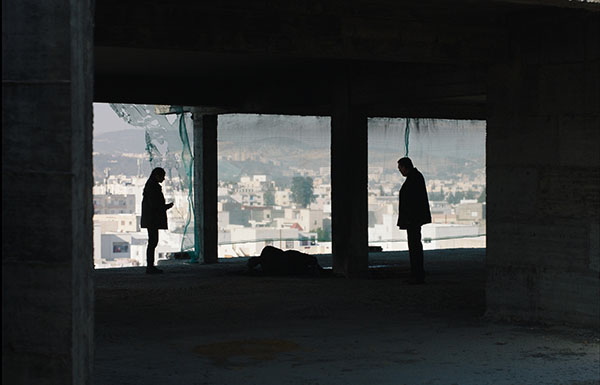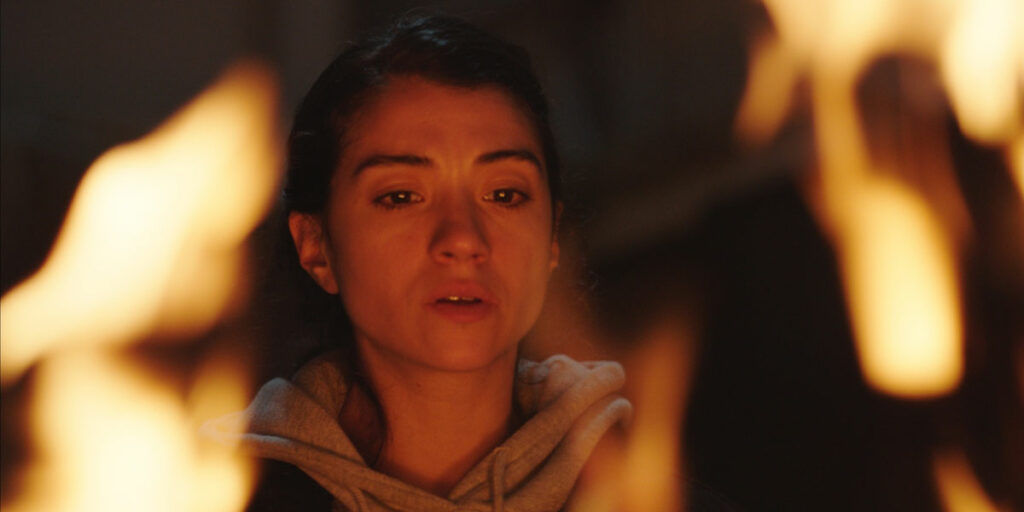Director Youssef Chebbi blends the crime thriller and neo-noir genres in Ashkal, a gorgeous yet unfocused investigative tale set in Tunis.
At the very start of Youssef Chebbi’s (Babylon) Ashkal, we learn that the Gardens of Carthage is a neighbourhood north of Tunis that was initially built for dignitaries of the old regime, and was meant to become a modern, enterprising part of the city. In December 2010, the first of a series of self-immolations set off the Tunisian revolution and the fall of Ben Ali, and the construction of the neighbourhood was put on hold. When the film begins, construction work has just resumed, and we are introduced to the key building in this story by means of gorgeous, symmetrical frames and desaturated shots, where the light is a little brighter and the shadows not as dark, almost as if in a dream. It’s a melancholic, hazy atmosphere that Ashkal draws us into, from the very first shot, introducing us to a place that’s almost stuck in time, as if it was keeping still and hiding from the world while, at the same time, waiting for something to happen.
And something does happen, as the body of a construction worker is found dead inside the building. And so, we come across two detectives, who are investigating and asking questions. The woman, Fatma (Fatma Oussaifi), asks the other builders if the deceased had a family, and they tell her about two children in Europe. “Did he have any issues with the workers? Did he insult or owe money to anyone?,” she continues. “He was self-sufficient and he feared God,” one of them replies. Which brings her to her final question: “Did he ever mention immolation or suicide?”. Though the men reply that he didn’t, Fatma later discusses the matter with her colleague, Batal (Mohamed Houcine Grayaa), who had been asking other workers about potential tensions between Tunisian and sub-Saharan workers. The two discuss the possibility of the man killing himself as a result of manipulation, in which case, Batal observes, “it must have been filmed. It’ll end up on social media.”
And so, within the first ten minutes of the film, not only do we learn that our two protagonists have no clue as to what caused the man’s death, but also that Fatma and Batal live in a world that looks very different to ours. In their universe, faceless, nameless people immolate themselves, fighting for a cause and losing their identities in the process, and often setting off even more self-destructive acts committed by crowds who have lived through a lot, and are desperate for change.

Of course, Ashkal doesn’t show us any of that, as at the core of the film is Batal and Fatma’s investigation, which soon becomes even more of a mystery as more bodies turn up and puzzling details emerge about the circumstances of their deaths. But what’s right under the surface is just as important in the film, and Youssef Chebbi and co-writer François-Michel Allegrini, as well as cinematographer Hazem Berrabah (Maj’noun), manage to give us a snapshot of a specific moment, frozen in time, where the memories of what happened before and the fear of what might happen next are shaping the city’s present and future. It’s a quiet, gloomy atmosphere that Ashkal conveys, reinforced by sound design (Aymen Labidi, Waldir Xavier and Mathieu Nappez) that often consists of single, long notes, giving an idea of suspension of time and adding a sense of foreboding to the film. And our two leading characters reinforce this feeling, as we often see them on their own, deep in thought, almost as if they had been abandoned and had just found themselves stuck in this still, ruthless place.
If Ashkal ‘s buildup of tension and mood is excellent, the same cannot be said of the story it tells. Though the film’s premise is compelling and definitely draws you in at the beginning, Ashkal soon gets lost into its own conjectures, losing pace and momentum in the process. Not only that, but supernatural elements are introduced that make us lose interest in the investigative part of the story, and neither of these aspects are dealt with with enough depth to bring us a satisfying conclusion.
Ashkal is a stunning film that has something meaningful and important to say, but its unfocused screenplay ultimately causes its message to partly get lost, making for less effective storytelling as a result. Yet, it’s still a technically impressive thriller, and I’ll definitely watch what Youssef Chebbi does next.
Ashkal premiered at the 2022 BFI London Film Festival on 5 October, 2022 and will be released in US theaters from August 18, 2023.

